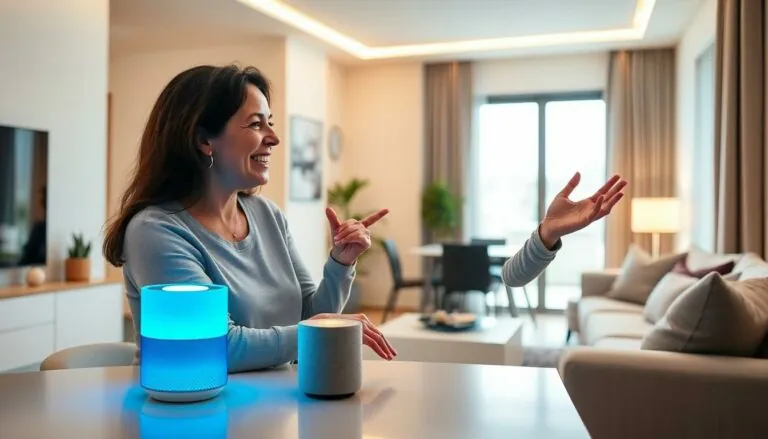In a world where your coffee maker might just know you better than your best friend, home automation certification is the golden ticket to mastering the tech-savvy lifestyle. Imagine waking up to the smell of freshly brewed coffee, all thanks to a little gadget that’s smarter than most of your relatives. It’s not just about convenience; it’s about turning your home into a futuristic haven that even the Jetsons would envy.
Getting certified in home automation isn’t just a feather in your cap; it’s a passport to a booming industry. As homes become smarter, the demand for knowledgeable professionals skyrockets. So why not jump on the bandwagon? With the right certification, you’ll not only impress your friends but also open doors to exciting career opportunities in a field that’s just getting started.
Table of Contents
ToggleOverview of Home Automation Certification
Home automation certification validates knowledge and skills in managing smart technologies. Being certified demonstrates expertise in installation, configuration, and troubleshooting of automated systems. Professionals in this field understand diverse devices, including security systems, lighting controls, and smart thermostats.
Certification programs often cover critical areas like network configuration, device integration, and user interface design. Coursework usually involves hands-on training, ensuring candidates gain practical experience. Organizations provide certifications to establish professional credibility and enhance career prospects.
The industry experiences rapid growth, increasing the need for certified individuals to manage advanced home systems. Employers often favor candidates with recognized certifications due to the complexity of modern smart home technologies. Job roles range from system installers to smart home consultants, offering various career paths.
Accredited programs usually focus on popular platforms and protocols used in home automation. Sensors, actuators, and controllers represent examples of such components that certified professionals frequently work with. Additionally, staying updated with evolving technology is crucial, as new devices and standards continually emerge.
Interest in home automation certification can stem from its potential to transform personal and professional lives. As smart homes become commonplace, professionals equipped with certification could benefit from job security and competitive salaries. Engaging with this certification can lead to meaningful contributions to the future of smart living environments.
Importance of Home Automation Certification

Home automation certification plays a crucial role in today’s technology-driven landscape. This certification ensures both consumers and professionals benefit significantly from its growing importance.
Benefits for Consumers
Consumers enjoy enhanced safety and energy efficiency when engaging with certified professionals. Certified experts implement advanced security systems, ensuring a safe living environment. They also optimize energy consumption, which reduces utility bills through smart technologies. Homeowners gain access to reliable support and troubleshooting knowledge, which leads to greater satisfaction with automated systems. Furthermore, certified professionals provide tailored solutions that align with specific lifestyle needs, ensuring that consumers get the most out of their smart devices.
Benefits for Professionals
Professionals experience significant career growth opportunities by obtaining home automation certification. With an increasing demand for certified technicians, job security improves in a burgeoning industry. They gain credibility and demonstrate expertise, making them more attractive to employers. Higher earning potential often comes with certification, as skilled workers command competitive salaries. Certified individuals can work in diverse roles, ranging from system installers to smart home consultants, allowing for varied career paths. Engaging with certification expands professional networks, connecting individuals with industry leaders and innovators.
Types of Home Automation Certifications
Home automation certifications fall into various categories, each tailored to specific roles within the industry. Understanding these distinctions helps individuals choose the right path for their careers.
Certification for Installers
Installers receive certifications that emphasize hands-on skills crucial for setting up smart home devices. Programs focus on installation techniques, system integration, and troubleshooting methods. Candidates learn about popular devices for security, lighting, and HVAC. Mastery of these skills ensures they can efficiently implement automation solutions. Many credible organizations offer certifications that validate these competencies, enhancing a professional’s marketability. Employers seek certified installers, as they demonstrate reliability and expertise. Individuals with this certification often gain access to higher-paying job opportunities and a competitive edge in the industry.
Certification for Designers
Designers pursue certifications that enhance their understanding of user experience in smart home systems. These programs cover layout design, user interface aesthetics, and functionality across diverse environments. Knowledge of various automation protocols and their integration is essential for creating seamless experiences. Skilled designers innovate solutions tailored to client needs, merging aesthetics with technology. Certification from reputable bodies affirms their expertise, making them desirable hires for firms that prioritize smart technology integration. Professionals with design certifications often secure roles that allow for creative expression and the opportunity to influence the future of automated environments.
Key Organizations Offering Home Automation Certifications
Numerous organizations provide home automation certifications that validate expertise in smart technology. This section highlights two prominent certifications.
AEA Certification
The Alarm Industry Association offers the AEA Certification. This program focuses on advanced electronic applications. Participants learn about installation, maintenance, and troubleshooting for security systems and smart devices. Course content covers critical areas, including technology integration and compliance with industry standards. Those who achieve AEA Certification demonstrate proficiency in leveraging automation for enhanced security and efficiency. By recognizing this certification, employers identify candidates with high levels of competency in electronic systems.
CEDIA Certification
CEDIA, the Custom Electronic Design and Installation Association, provides robust certifications tailored to professionals in the home automation field. Their programs cover essential skills in designing and installing integrated home systems. Certifications include a focus on audio, video, and network technologies, promoting best practices in the industry. With hands-on learning components, CEDIA ensures candidates gain practical experience. Professionals with this certification stand out to employers who seek qualified individuals for complex home automation projects. Those certified by CEDIA often enjoy greater job opportunities and career advancement.
How to Choose the Right Certification Program
Choosing the right certification program in home automation requires careful consideration of various factors tailored to individual and business needs.
Considerations for Individuals
Individuals should assess their career goals when selecting a certification program. Identifying specialization areas, such as installation or design, enhances focus. The program’s recognition within the industry plays a crucial role in hiring prospects. Evaluating available hands-on training components ensures practical skills development. Checking prerequisites before enrollment helps manage expectations and readiness. Additionally, comparing different program durations and formats supports a balanced approach to learning.
Considerations for Businesses
Businesses must align certification programs with organizational goals to ensure value. Recognizing trends in home automation technology aids in choosing relevant certifications. Offering programs that focus on popular smart home platforms increases employee expertise. Assessing the potential return on investment demonstrates the benefits of trained professionals. Facilitating flexible training schedules accommodates diverse employee needs, fostering engagement and participation. Finally, considering partnerships with certification organizations can enhance reputation in the industry.
Home automation certification stands as a crucial stepping stone in an increasingly tech-savvy world. It not only validates expertise but also opens doors to a wealth of career opportunities. As smart homes continue to evolve, certified professionals will be at the forefront of this transformation.
The benefits extend beyond personal advancement; consumers gain access to safer and more efficient living environments through the skills of certified experts. With a variety of certification options available, individuals can tailor their learning to specific roles and interests.
Embracing home automation certification is more than just a career move; it’s a commitment to shaping the future of smart living. By investing in this knowledge, professionals can secure their place in a dynamic industry poised for growth.





